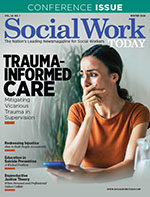|
Winter 2024 Issue Education: Mental Health Support in Social Work Graduate Programs Future social workers learn the fundamentals of their roles in the field—to apply values, principles, and techniques to help communities and individuals obtain services and counseling to improve their daily lives. These are the fundamentals of training during the two years of the master’s degree program. Future social workers learn to see the worth of the client and understand their needs from a social justice perspective. What’s not addressed during graduate education is the stigma of mental health issues among social work professionals and how students themselves can be affected by this stigma. Due to the rigorous demands of the MSW programs (such as completing classwork, unpaid part-time fieldwork, and part-time or full-time paid work to make ends meet), priorities and responsibilities shift, often leaving students’ mental health needs unmet, denying students a sense of healing while simultaneously increasing their imposter syndrome symptoms. Second-year students have to transition from students to professionals quickly while feeling the effects of stigma and imposter syndrome. This creates an obstacle as they become mental health providers without receiving proper mental health care themselves. Second-year students often focus on finding a job and passing a licensing exam, and the skills for addressing stigma and mental health are overlooked by educators and peers. Anxiety and Depression in Social Work Graduate Students The Power of Stigma The experience of feeling stigmatized causes more anxiety and depression. Stigma creates feelings of isolation, loneliness, and internalized perceptions of failure. Even though social work students are surrounded by those who care deeply, they can often feel alone in their anxiety and depression. These feelings can create a cycle that promotes imposter syndrome in soon-to-be social workers who feel unfit for this profession due to mental health issues and will cause more anxiety and depression. Stigma and imposter syndrome correspond with the rise of self-blame and the drop in one’s perception of self-worth.4 As a result, students may not disclose these rising feelings or seek support due to self-blame. The stigma surrounding mental illness in today’s society can negatively affect the success of future social workers by creating an environment in which imposter syndrome is prevalent but not acknowledged or discussed. Stigma and Its Effects on BIPOC Social Work Students Previous research has attributed factors such as family environment, parenting style, generational documented status, race, and socioeconomic levels as determinants of imposter syndrome. BIPOC students experience more discrimination than their white counterparts in mental health programs. There’s a direct link between BIPOC students’ mental health and levels of burnout to the experience of discrimination in their respective graduate programs.6 Research has shown that there are high levels of adverse childhood experiences within the BIPOC community, which can influence students’ imposter syndrome as they navigate social class, immigration status, first-generation difficulties, and intersections with mental illness, community, and cultural stigma.7 BIPOC students’ lived experiences before and during graduate degree programs directly affect how they process mental health stigma and imposter syndrome in their careers. Necessary Changes — Arlynn Baer, MSW, is a recent graduate of NYU Silver School of Social Work and has six years of experience in youth development and outreach for different rowing programs. She spent the last year working in research for in-patient psychiatric support and previously worked with elementary and middle school-aged students at a school in Newark, New Jersey. Baer hopes to continue working with school-aged youth in the sports social work field. — Rebeca Campos Baccas, MSW, is a recent graduate of NYU Silver School of Social Work and has several years of experience working with unaccompanied youth and families. She has prior experience working with former inmates in a reentry program with domestic violence survivors and spent the last year researching in-patient psychiatric support. She hopes to combine her interest in macro and micro settings to work in immigration reform and policy-making to work with undocumented children.
References 2. Hoying J, Melnyk BM, Hutson E, Tan A. Prevalence and correlates of depression, anxiety, stress, healthy beliefs, and lifestyle behaviors in first‐year graduate health sciences students. Worldviews Evid Based Nurs. 2020;17(1):49-59. 3. Covarrubias I, Han M. Mental health stigma about serious mental illness among MSW students: social contact and attitude. Soc Work. 2011;56(4):317-325. 4. Clark P, Holden C, Russell M, Downs H. The impostor phenomenon in mental health professionals: relationships among compassion fatigue, burnout, and compassion satisfaction. Contemp Fam Ther. 2021;44(2):185-197. 5. Ahmed A, Cruz T, Kaushal A, Kobuse Y, Wang K. Why is there a higher rate of impostor syndrome among BIPOC? Across the Spectrum of Socioeconomics. 2020;1(2):1-17. 6. Basma D, DeDiego AC, Dafoe E. Examining wellness, burnout, and discrimination among BIPOC counseling students. J Multicult Couns Devel. 2021;49(2):74-86. 7. Slopen N, Shonkoff JP, Albert MA, et al. Racial disparities in child adversity in the US: interactions with family immigration history and income. Am J Prev Med. 2016;50(1):47-56. |


